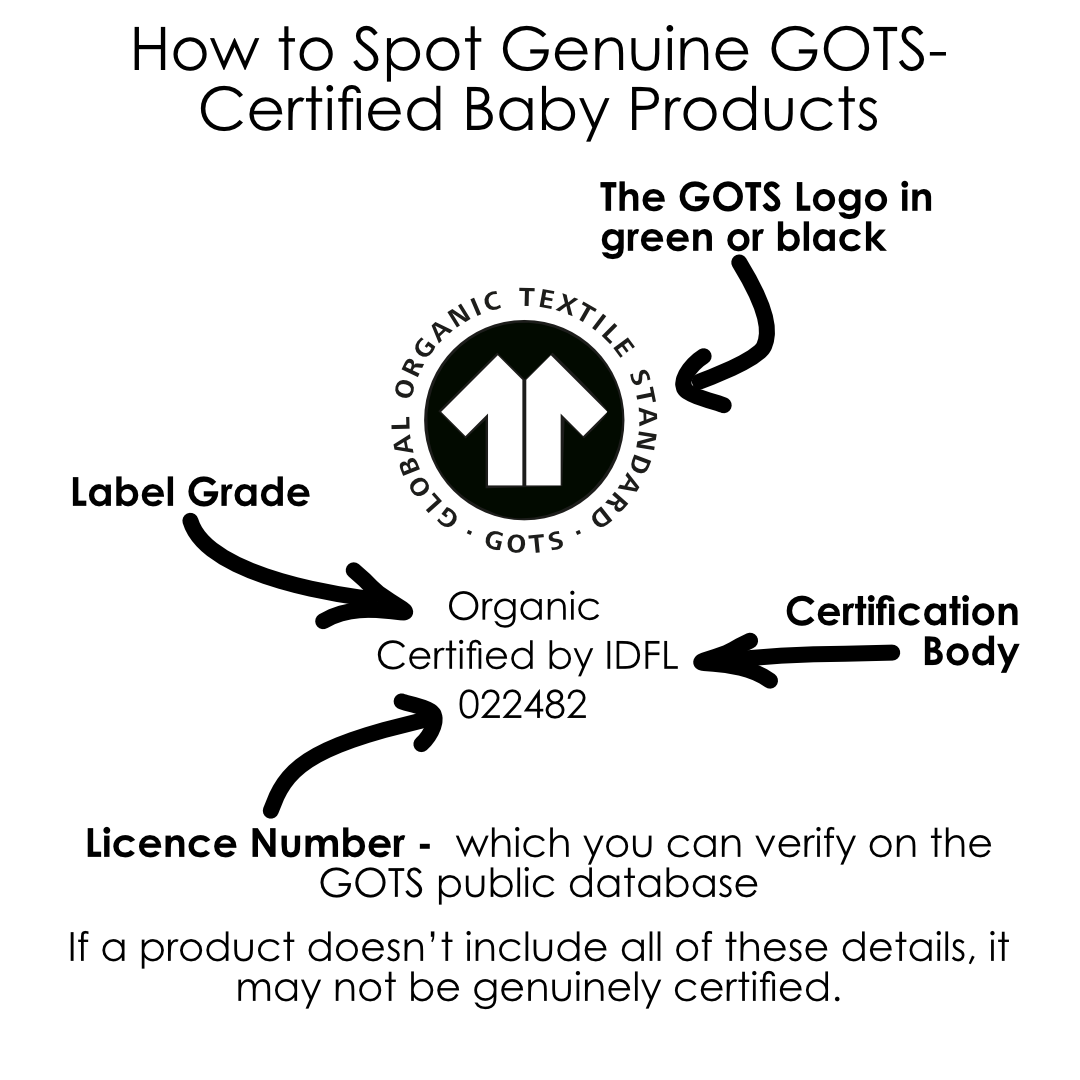
A Mother’s Guide to Choosing Safer, Kinder Baby Products with GOTS Certification.
As a parent, you want the very best for your baby—from the food they eat to the clothes that touch their skin. But how can you be sure that “organic” baby products are in fact organically produced?
When it comes to textiles like sheets, baby grows, blankets, and bibs, the Global Organic Textile Standard (GOTS) is considered the most trusted certification in the world. It’s more than just a label—it’s a promise of purity, safety, and care at every step of the journey.
Why GOTS Matters for Your Baby
Your baby’s skin is delicate—more absorbent and sensitive than yours. That’s why it’s so important to choose fabrics that are free from harsh chemicals, dyes, and residues.
GOTS-certified baby products are:
- Free from harmful substances like formaldehyde, heavy metals, and toxic dyes, making them soft and gentle on sensitive skin
- Made with certified organic fibers, grown without pesticides or GMOs
- Produced ethically, with fair wages and safe working conditions for workers
It’s peace of mind—for you and your little one.
Not All “Organic” Labels Are Equal
Many cotton items are marketed as “organic,” but unless they’re certified, there’s no guarantee they truly are. It’s possible that they contain only a small percentage of organic material—or none at all. Without third-party verification, these claims can be misleading.
GOTS certification ensures that the entire process—from farm to finished product—is held to the highest environmental and social standards. It’s the only way to be sure that “organic” really means what it says.

The 4 parts to a GOTS claim:
- The GOTS Logo – a green circle with a white shirt
- Label Grade – either “organic” (95%+ organic fibers) or “made with organic” (70%+)
- Certification Body – such as IDFL, Soil Association, Ecocert or Control Union
- License Number or Brand Name – which you can verify on the GOTS public database
If any of these are missing, a product may not be genuinely certified.
How GOTS Compares to Other Certifications
There are other labels out there, but they don’t all offer the same level of protection. In summary:
- OEKO-TEX® Standard 100 checks for harmful substances in the final product but doesn’t require organic fibers or ethical production.
- Organic Content Standard (OCS) verifies the amount of organic material but doesn’t regulate chemical use or labor practices.
- Fair Trade Certified supports ethical labor but doesn’t guarantee organic or chemical-free textiles.
- Only GOTS brings all of this together—organic materials, chemical safety, environmental care, and social responsibility.
A Small Choice with a Big Impact
Choosing GOTS-certified baby products is a simple but powerful way to protect your baby’s health, support ethical practices, and care for the planet they’ll grow up in. It’s one of those little decisions that makes a big difference.
We aim to produce the best, most natural products for babies. For this reason we made the first 100% Organic cotton fitted sheets back in the 1990s, and made the decision to became a GOTS certified manufacturer in 2015, gaining our certifiction in 2016. We remain one of ony a few UK manufacturers to have taken this step.
The problem with non-organic cotton:
Regular, non-organic cotton production is very polluting to the environment. Nearly 16% of the world’s insecticides are used on cotton growing. Only oil production uses more chemicals.
Organic cotton helps protect the environment by removing toxic pesticides and other chemicals from thegrowing and processing. By removing these costly inputs, workers in developing countries can afford to improve their social conditions, at the same time reducing the effects of toxic chemicals on their health.
- Organic cotton benefits the environment.
Organic fibers are grown without the use of synthetic fertilizers or toxic pesticides. By building soil fertility organic farmers help lock CO2 into the soil, helping mitigate climate change. It also avoids the use of the toxic pesticides that, in non-organic systems, are responsible for poisoning wildlife and rivers, as well as killing an estimated 16,000 people each year.
- It’s better for workers
By avoiding toxic pesticides cotton workers benefit by avoiding the associated health problems and deaths common in non-organic cotton production. Avoiding pesticides also reduces production costs and farmer debts – the burden of pesticide debt has resulted in thousands of suicides in the developing world.
- It’s GM Free
GM is banned in organic systems, while an estimated 30% of all cotton grown worldwide is genetically modified. GM cotton poses a potential risk to wildlife and human health, as well as exposing farmers to unnecessary expense.
Citation: www.soilassociation.org
